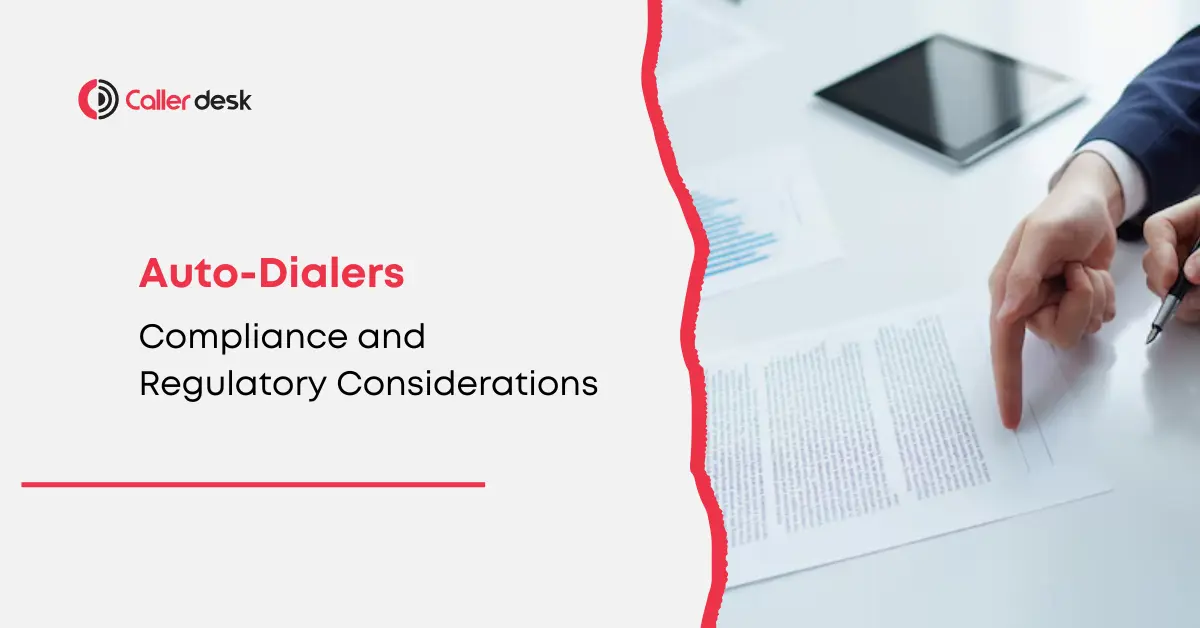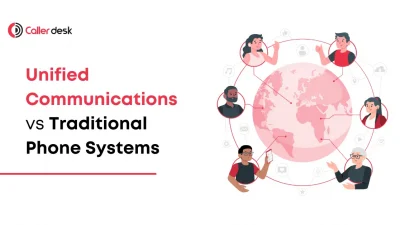Are you using auto-dialers to boost your customer outreach but unsure about the legal requirements? While auto-dialers can revolutionize communication, businesses often underestimate the compliance risks. Failing to follow regulatory standards can result in hefty fines, reputational damage, or even operational shutdowns.
Understanding the legal framework and best practices is essential to use auto-dialers responsibly. This blog provides a comprehensive guide to the compliance and regulatory considerations for businesses in India, ensuring you can maximize the benefits of auto-dialers without risking legal trouble.
Key Regulations Governing Auto-Dialers in India
1. TRAI Guidelines
The Telecom Regulatory Authority of India (TRAI) oversees telecommunications and has strict rules to protect consumers from spam and unwanted calls.
Compliance Requirements:
- Use auto-dialers only for calls that comply with TRAI’s spam control policies.
- Ensure calls are clearly identified as commercial or informational.
Real-World Example:
A marketing firm violated TRAI guidelines by making unsolicited calls using an auto-dialer. They faced fines exceeding ₹10 lakh and suspension of their call campaigns for six months.
Tip: Avoid similar outcomes by aligning your auto-dialer practices with TRAI’s spam and transparency policies.
2. Do Not Disturb (DND) Regulations
The DND registry allows customers to block unsolicited commercial calls. Businesses must verify their contact lists against the DND database and avoid contacting registered numbers.
Why It’s Important:
Violating DND regulations can damage your brand’s reputation and lead to penalties.
Example:
An insurance company regularly cross-checks its call lists with the DND registry. As a result, it has reduced customer complaints by 50% and enhanced its brand reputation.
3. Consumer Protection Act, 2019
The Consumer Protection Act mandates ethical practices in commercial communication. Businesses must provide accurate, transparent information during calls made through auto-dialers.
Example in Action:
A telecom provider received praise for ensuring all auto-dialer communications included clear details about their promotional offers. This compliance built customer trust and reduced complaint rates.
Best Practices for Compliance When Using Auto-Dialers
1. Obtain Customer Consent
Always secure explicit permission before contacting customers. This can be done during service sign-ups or via opt-in forms.
Interactive Idea: Add a checklist for businesses to confirm they’ve obtained proper consent for all contacts.
2. Maintain Detailed Call Logs
Track and record every call made through your auto-dialer, including:
- Date and time.
- Consent records.
- Call outcomes.
Why It Matters:
Detailed logs serve as evidence of compliance and are invaluable during audits or disputes.
3. Regularly Update Contact Lists
Verify and clean your contact lists periodically to avoid calling outdated numbers or individuals registered on the DND list.
Example:
A logistics company updates its contact lists weekly to ensure compliance with DND regulations, reducing call rejections by 40%.
4. Train Your Team on Compliance
Educate staff on auto-dialer regulations to prevent unintentional violations.
Example in Action:
A financial firm conducts bi-annual training sessions on TRAI and DND guidelines. As a result, they’ve maintained 100% compliance for three consecutive years.
5. Develop and Update a Compliance Plan
Create a clear, actionable compliance plan covering all legal requirements and best practices. Review and update it regularly to stay aligned with new regulations.
Visual Aid Suggestion: Include a flowchart summarizing the steps in a compliance plan.
Why Compliance Matters
Using auto-dialers responsibly protects your business from legal risks while enhancing customer trust and satisfaction.
1. Avoid Legal Fines
Breaking laws like GDPR, TCPA, or India’s Personal Data Protection Bill (PDPB) can result in huge penalties that harm your business.
- Staying compliant saves you from costly fines and keeps your operations running smoothly.
- A company fined millions for mishandling customer data also lost its credibility and loyal customers.
2. Build Customer Trust
When customers see that you handle their data responsibly, they’re more likely to trust your brand.
- Trust leads to repeat business and positive word-of-mouth.
- Businesses that prioritize customer privacy are often recommended more and attract loyal customers.
3. Streamline Operations
Following compliance guidelines helps your business run more efficiently by providing clear processes for managing data.
- You reduce errors, speed up tasks, and make audits simpler.
- Companies with strong compliance practices face fewer disruptions during audits and day-to-day operations.
Emerging Trends in Compliance
1. AI-Driven Compliance Monitoring
Artificial Intelligence is changing how businesses ensure compliance. AI tools monitor auto-dialer activity in real-time to detect and prevent issues like:
- Calling numbers on the Do-Not-Disturb (DND) list.
- Contacting customers outside permissible hours.
Example:
A telemarketing company avoids fines by using AI-powered systems that block calls to restricted numbers before they happen.
2. Integration with CRM and DND Databases
Modern auto-dialers now integrate directly with CRMs and DND databases, automating critical compliance tasks.
How It Helps:
- Numbers are automatically checked against DND lists before dialing.
- Customer preferences from CRMs personalize interactions, improving customer experience.
Example:
A customer support team contacts only opted-in customers, ensuring compliance while offering tailored assistance based on CRM data.
Conclusion
Auto-dialers are a powerful asset for customer outreach, but compliance is non-negotiable. By adhering to TRAI guidelines, respecting DND regulations, safeguarding data privacy, and following best practices, businesses can unlock the full potential of auto-dialers while staying legally secure.
Compliance isn’t just about avoiding fines—it’s about earning customer trust and building a solid foundation for growth.
Need help implementing compliant auto-dialer solutions? Callerdesk offers advanced, secure systems tailored to Indian regulations, ensuring your campaigns are efficient and compliant.
Call-to-Action
Ensure Compliance with Callerdesk!
Stay ahead of the competition with our tailored, compliant auto-dialer solutions designed for Indian businesses.
Request Your Free Consultation Today: Learn how Callerdesk can help your business achieve seamless compliance and enhanced customer satisfaction.
Frequently Asked Questions
1. What is the significance of TRAI guidelines for auto-dialers?
TRAI guidelines prevent spam and ensure responsible commercial communication, protecting both businesses and consumers.
2. How can businesses ensure compliance with DND regulations?
Regularly update contact lists and cross-check them against the DND database to avoid contacting registered numbers.
3. Why is data protection important for auto-dialers?
Data breaches can result in legal penalties, customer mistrust, and reputational damage. Following best practices ensures secure and responsible use of customer data.
4. How does Callerdesk support compliance?
Callerdesk provides advanced, secure auto-dialer solutions with built-in compliance features, ensuring adherence to TRAI and DND regulations.
5. What steps can businesses take to create a compliance plan?
Outline legal requirements, train staff, and implement regular audits to ensure all aspects of auto-dialer usage align with regulatory standards.





